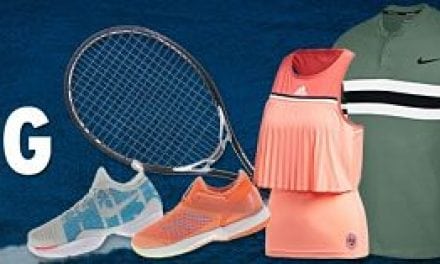In a 60-minute Instagram LIVE session with Stan Wawrinka, the World No.1 shared his views on helping tennis' less fortunate earners.
Novak Djokovic and Stan Wawrinka addressed the subject of providing aid to the lower-ranked professional tennis players during an Instagram LIVE chat, with Djokovic explaining his views on the subject and how he sees a plan coming to fruition.
This comes a day after journalist Jon Werthiem posted an email from Djokovic, with sign-off from both Rafael Nadal and Roger Federer that outlined a plan to provide relief to players ranked below 250 from a soon to be established fund that will include donation from higher-ranked players as well as contributions from all four Grand Slams and the ATP Tour. It isn’t known if the WTA will take part, but Djokovic did mention the women as he explained his views on the plan to Wawrinka today.
“Especially lower-ranked guys, who are struggling the most of anybody, because the majority of the guys ranked 200 or 250 to 700 or a thousand don’t have federation support, don’t have sponsors, so they are completely independent and kind of left alone,” Djokovic said. “So, I’m really glad that ATP, Grand Slams now, most likely, and players, hopefully if we all get together, will contribute collectively to the Player Relief Fund, that the ATP will distribute using certain models and criteria.”
Djokovic is calling for larger contributions from the top players, that will then be scaled down to be smaller for players outside the Top 20 and also doubles players. He says the plan will also look individually at more than just the players current ranking to decide which players are truly in need and which are not, with the example of a wealthier player that is currently outside the Top 200 due to inactivity due to injury being used.
Djokovic also spoke about his long term hopes of using this period to improve the tour for lower-ranked players in the future. I don't think he is wrong. pic.twitter.com/7cydQrlt4m
— Tumaini Carayol (@tumcarayol) April 18, 2020
“Right now it looks like there is going to be hopefully somewhere between $3 and $4.5 million dollars that is going to be distributed to these lower-ranked guys,” Djokovic said.
The subject has been talked about for a long time, with not much traction happening, even though tennis has constantly heard tales of players ranked as high as the Top 80 not being able to break even after putting up their travel and coaching expenses. Many in the top 100 are forced to decide against luxuries like a physio or a mental coach due to the financial strain and irregularity of income on tour.
With the Coronavirus pandemic causing incomes to be halted in the sport, there has never been a better time to take a good, hard look.
“I’m really glad that the tennis ecosystem is coming together, because I realizes the importance of the base of the tennis,” Djokovic said. “These guys that are ranked from 250 onwards, they are the ones that make the grassroots of tennis, they make the future of tennis, and I feel like we have to be united, we have to show support, we have to show them that they are not forgotten, that we are there for them but also I feel that we have to send a message to the younger generations that are taking in consideration to be professional players to show them that they can live out of tennis even in the times when there is a pandemic, when there is a financial crisis, that they can rely on the support of the top guys, of the ATP as a governing body, of the ITF, and Grand Slams.”
Djokovic hopes to see the improvements last much longer than the Coronavirus.
“I think what we did not in the short term, of coming together for this cause, I think this is necessary to happen in the long term,” Djokovic said. “You have ITF… You have Grand Slams, you have ATP as well you have WTA–all of us have to consolidate somehow and come up with a plan, and a system that will support especially the base or the grassroots of tennis which is the lower-ranked guys, both men and women, we have to somehow regulate better the initial levels of professional tennis and allow these players that are starting to play professional tennis to have an easier way of transitioning to the higher levels.”


















